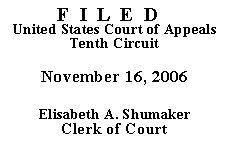

| UNITED STATES OF AMERICA,
Plaintiff-Appellee, v. FELIPE VALADEZ-PEREZ, Defendant-Appellant. |
|
In sentencing defendant, the district court accepted the plea agreement's stipulated offense level of 19 and, after listening to the parties' respective arguments, it also accepted the criminal history category calculation set forth in the presentence report, which was a category of IV. See Tr. of Sentencing Hrg. at 11. These two factors yielded a guideline sentencing range of 46 to 57 months. The district court sentenced defendant to a term of 46 months' incarceration, followed by a three-year term of unsupervised release. The court declined to impose a fine, but it did impose a special assessment of $100.00. The court found the sentence to be reasonable under 18 U.S.C. § 3742(A). As defendant acknowledged in the plea agreement, the maximum sentence the court could have imposed under the applicable statute was up to 20 years' imprisonment, a mandatory term of not more than three years' supervised release, a fine not to exceed $250,000, and a special penalty assessment of $100.00. See Plea Agreement at 2.
Notwithstanding the appeal waiver in his plea agreement, defendant appealed. The government has moved to enforce the appeal waiver under United States v. Hahn, 359 F.3d 1315 (10th Cir. 2004) (en banc). For reasons explained below, we grant the motion and dismiss the appeal.
Under Hahn, we consider "(1) whether the disputed appeal falls within the scope of the waiver of appellate rights; (2) whether the defendant knowingly and voluntarily waived his appellate rights; and (3) whether enforcing the waiver would result in a miscarriage of justice." Id. at 1325. The miscarriage-of-justice prong requires the defendant to show (a) his sentence relied on an impermissible factor such as race; (b) ineffective assistance of counsel in connection with the negotiation of the appeal waiver rendered the waiver invalid; (c) his sentence exceeded the statutory maximum; or (d) his appeal waiver is otherwise unlawful. Id. at 1327. The government's motion addresses these considerations, explaining why none of them undermines defendant's appeal waiver. Upon review of the pertinent plea and sentencing materials, we agree.
In response to the government's motion, defendant's counsel "agree[d] with the government's contention that the defendant waived his right to appeal the sentence in this case pursuant to the 11(c)(1)(C) plea agreement that was entered into by the parties," stated that he did not have "a legitimate basis for contesting the government's Motion," and noted his intent to submit a brief pursuant to Anders v. California, 386 U.S. 738 (1967), and to seek leave to withdraw should the appeal go forward. Response to Government's Motion for Enforcement of Plea Agreement at 2. Subsequently, this court provided defendant with copies of the government's motion and counsel's response and gave him the opportunity to argue why this appeal should be heard despite his appeal waiver. He did not respond.
We have carefully reviewed the plea agreement and the transcript of the hearing at which defendant entered his guilty plea. We conclude that the Hahn factors have been satisfied.
Accordingly, we GRANT the government's motion to enforce the plea agreement and DISMISS the appeal. The mandate shall issue forthwith.
ENTERED FOR THE COURT
PER CURIAM
*. This panel has determined unanimously that oral argument would not materially assist the determination of this appeal. See Fed. R. App. P. 34(a)(2); 10th Cir. R. 34.1(G). The case is therefore ordered submitted without oral argument. This order and judgment is not binding precedent, except under the doctrines of law of the case, res judicata, and collateral estoppel. The court generally disfavors the citation of orders and judgments; nevertheless, an order and judgment may be cited under the terms and conditions of 10th Cir. R. 36.3.